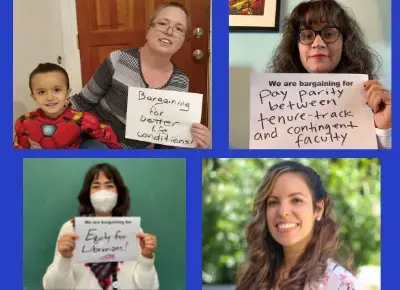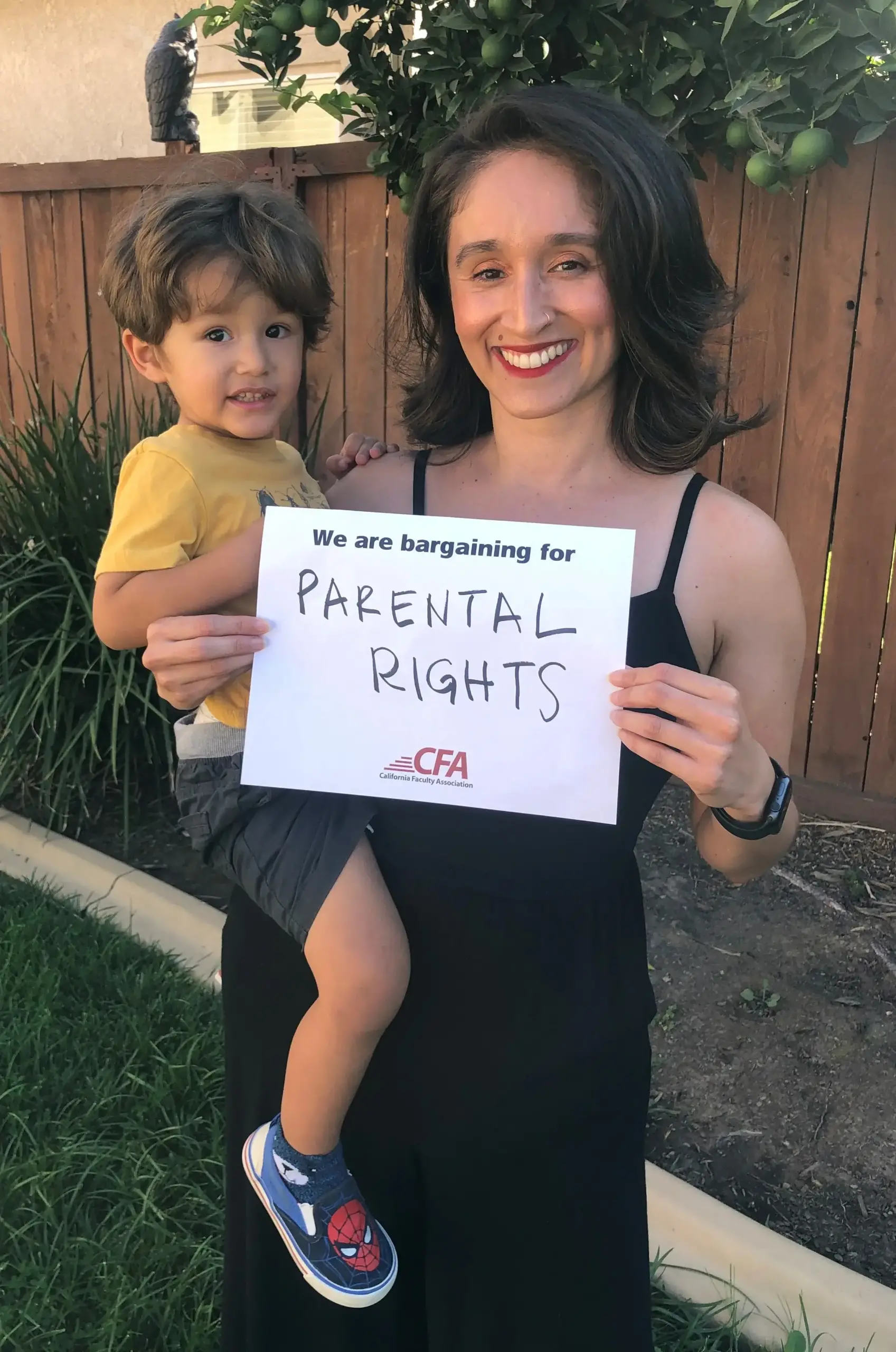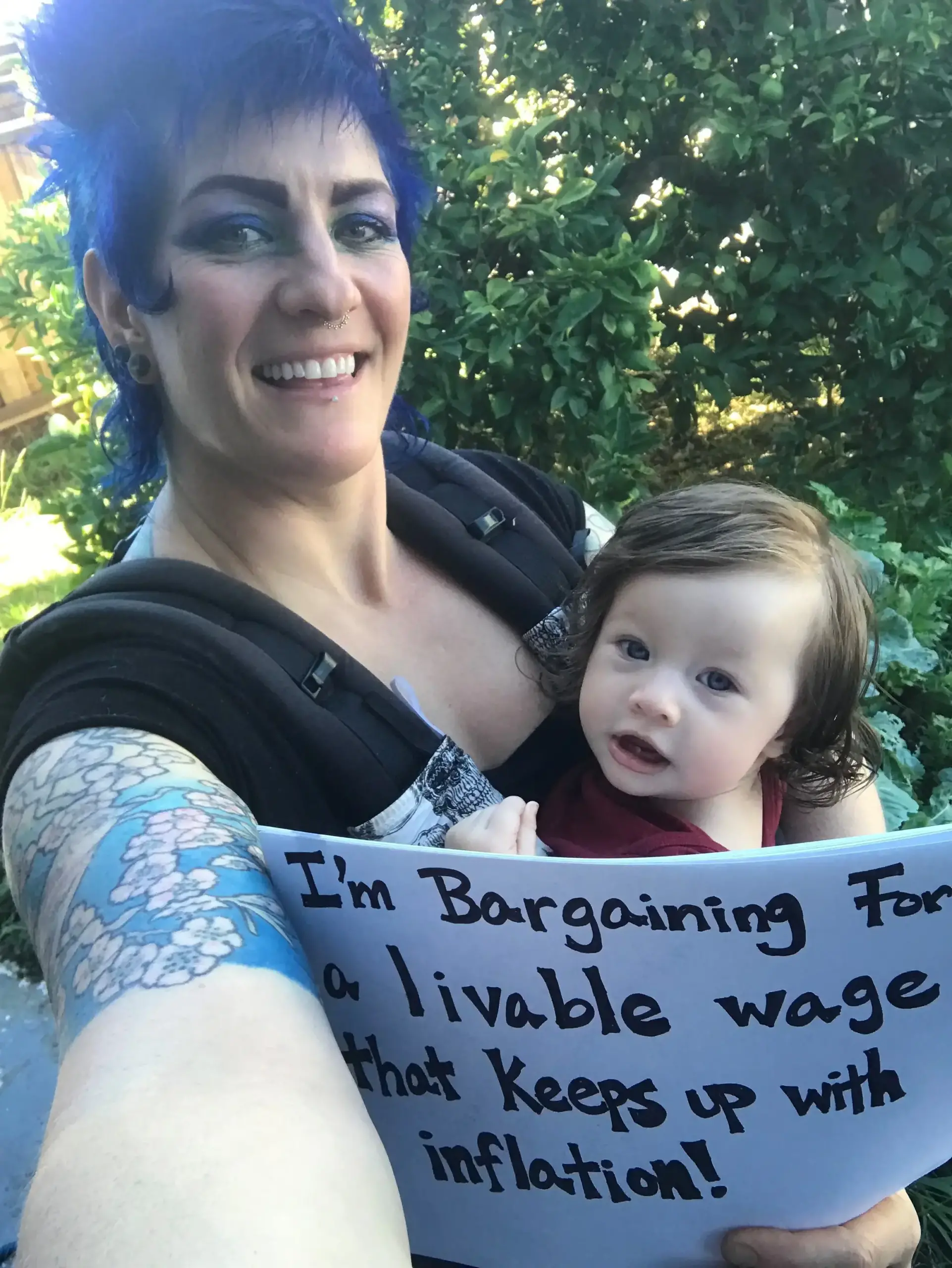Members Reveal Cruelty of CSU Parental Leave Policy
When Cal State East Bay librarian Lana Wood was pregnant with her second child, she knew the CSU would not provide much parental leave. Because of that, she worked until her due date and was induced the next day.
“One of my friends is a nursing faculty on campus, and she kept a tarp in her car in case she needed to rush me to the hospital in labor,” the CFA member said.
Though her baby’s birth ran smoothly, Wood said the CSU’s parental leave policy of 30 days needs to be updated to reflect today’s realities facing the system’s 29,000 coach, counseling, librarian, and instructional faculty who are starting or expanding their families.
The CFA Bargaining Team has been negotiating a new collective bargaining agreement with CSU management for the past 18 months. To help alleviate the stress, planning, financial strain, and disparate impact on women and faculty of color, CFA’s team proposed extending parental leave to one semester or two terms.
CSU’s 30-day leave is not working.
On their own time, faculty at East Bay researched and created a spreadsheet they circulate listing the various forms of federal, state, and CSU leave programs they can use to cobble together a meager number of months to bond with newly birthed or adopted children.
For her first child, Wood delayed her start date with East Bay to get five months with her newborn – the five months were unpaid. During her second pregnancy, Wood hoarded vacation and sick time, only using PTO (Paid Time Off) when her older child was sick. She also switched from a 12-month employment contract to a 10-month term, which amounted to a 15-percent pay cut that year.

“The CSU’s expectations for what we have to do to spend time with our new children and allow our bodies to heal are ridiculous, unrealistic, and disappointing,” Wood said.
Trying to find the right moment to start a family can prove difficult.
“When I was in grad school, I postponed having kids because you’re supposed to make sure you have a steady job, and then you have to make sure you’re acclimated to your job,” said Martha D. Escobar, CFA member and Chicana/o studies professor at Cal State Northridge who zeroed out her sick leave bank to get time off after each of her children were born. “Then you have to try to time the birth so you can maximize your time away from work. Having kids shouldn’t be so formulaic.”
As she watches colleagues around her contemplate their family planning timelines, Escobar said she’s reminded of eugenics.
“The 30-day-leave policy shows that the CSU is an inhumane institution,” Escobar said. “It’s almost like eugenics. Only those who have the wealth and ability to take the time off are able to have families. It’s like those people who think ‘if you can’t afford it, you shouldn’t have it.’”
If the CSU is truly committed to anti-racism, diversity, and inclusion as it claims to be, CSU management would have whole-heartedly signed off on our proposal to extend parental leave and come closer to providing a work-life balance, the CFA member said.
But instead, CSU management clings to an antiquated leave policy that disparately impacts women and faculty of color, as the COVID-19 pandemic so bluntly laid bare. At a crisis point, many CFA members are advocating system-wide and on their campuses for COVID-19 relief for parents and caregivers, as well as forming the CFA Parents and Caregivers Coalition.

“The CSU needs to look at the structures and policies that marginalize and penalize women of color like their current parental leave. We know from the research that women of color in academia experience less mentoring, slower rates of promotion, race-gendered microaggressions, and an increased likelihood of leaving an institution compared to their male and racial/ethnic counterparts,” said Alma Itzé Flores, CFA member and Education professor at Sacramento State who was back to answering work emails soon after leaving the hospital following the birth of her first child. “The pandemic has exacerbated these inequities, with many women leaving the workforce. One simple but significant way to make sure you retain women of color faculty is to commit to a semester/two term parental leave.”
CSU’s insufficient 30 days for new parents is also a threat to the health and safety of its employees and their families. When planning for her first child, CFA member Anne Luna-Gordinier stressed about the best timing for years. “How do I maximize my time with my child without taking unpaid leave?” she debated
“The CSU must acknowledge the intersecting realities for their workers like the high cost of childcare, the uneven interactions with healthcare providers,” said Luna-Gordinier, sociology professor at Sacramento State. “And the health risk, especially to Black women whose symptoms are not listened to by their healthcare professionals, who have a harder time getting access to quality healthcare, and who have alarmingly high childbirth mortality rates.”

The CSU’s disparity in parental leave continues to set us apart from other developed, capitalist – not even socialist, but capitalist – societies. The CSU should be able to meet this basic standard, Luna-Gordinier added. The average length for countries with national paid parental leave is 29 weeks.
A minimum would benefit students in many ways. If faculty are provided a semester off, there’s less tinkering with schedules and pressure on faculty to find others to take over their workload. Much of that burden falls on faculty and adds to the stress soon-to-be parents are already facing.
Women take on so much unpaid labor, it’s the way our society is structured. Women shoulder so much of the care, cooking, education, nurturing, researching of schools and daycare on top of the teaching and service delivery for students, said Vilma Villela, Cal State Northridge lecturer in Chicana/o studies and CFA member.
Over the last several years, Villela ramped up her attention to student retention and was hyper focused on her second child’s birth not impacting student learning. Her worry caused her water to break before her baby’s due date. While she was in the hospital about to give birth, Villela was working on lesson plans for the faculty taking over her classes.
“The CSU’s current parental leave policy is so disruptive. I was working while in the hospital, I was working on sub plans on assignments for my students so they would have some continuity, so there wouldn’t be an effect on student learning. It affected my child’s birth, and my health,” said Villela, tearing up at the memory.
Faculty have experienced similar reactions due to the stress and lack of support from their employer. The anxiety and worry have led to lower milk production, deeper post-partum depression, and relationship tensions for faculty.
Some of that anxiety is wrapped up in the knowledge that taking leave impacts faculty career trajectories. By delaying her start date, East Bay’s Wood delayed her tenure clock by a year.
CFA member Michelle Soto-Peña wants the CSU to offer the option of pausing the tenure clock when faculty birth or adopt children to allow the “luxury” of time to heal their bodies and bond with their families.
“I should have the equitable opportunity to commit to my family and have a balance between work and life,” said Soto-Peña, education professor at Cal State Fullerton who also cleared out her leave banks to scrounge up a small amount of time to spend with her two children after their births.
CFA’s parental leave proposal provides the CSU an opportunity to recognize the lived realities of their workers.
Will CSU Chancellor Joseph I. Castro do right by faculty?
“CFA’s parental leave proposal allows for equity,” Soto-Peña said. “We’re humans and our lives aren’t designed to be on the clock all the time. My value shouldn’t be tied to my productivity. It should be tied to me being a human.”
Join California Faculty Association
Join thousands of instructional faculty, librarians, counselors, and coaches to protect academic freedom, faculty rights, safe workplaces, higher education, student learning, and fight for racial and social justice.